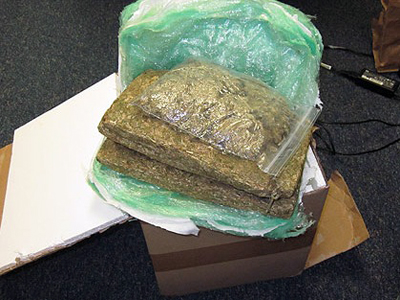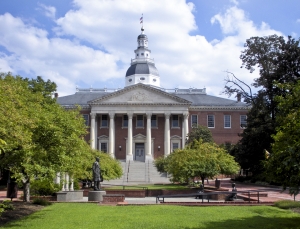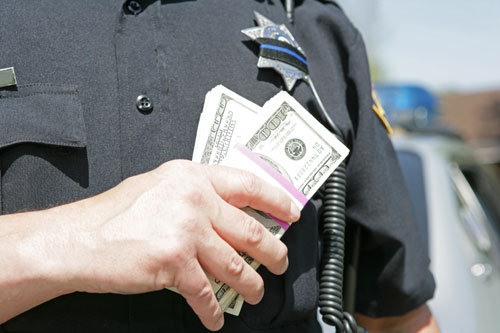 Large scale drug smuggling operations are usually prosecuted in federal court, but when the feds decline to take over an investigation it gives the local police some time in the spotlight. The Harford County Sheriff has announced the details of a two year long drug trafficking investigation, that spanned from California to Maryland. The investigation began back in 2010, and police began making arrests in October of 2012. As many as 15 people have been arrested and charged with various crimes under the Maryland controlled dangerous substance laws. Some of the cases have already been resolved by way of guilty pleas, and others remain open with pending trial dates. Police first began their investigation after a 2010 tip from a citizen revealed that an Aberdeen man had been selling large amounts of marijuana throughout Harford County. Over one year later, cops received another tip that linked an Abingdon man with the alleged Aberdeen dealer. This second tip seemed to jumpstart county police into action, as cops began a lengthy undercover operation designed at building a case against all of those involved.
Large scale drug smuggling operations are usually prosecuted in federal court, but when the feds decline to take over an investigation it gives the local police some time in the spotlight. The Harford County Sheriff has announced the details of a two year long drug trafficking investigation, that spanned from California to Maryland. The investigation began back in 2010, and police began making arrests in October of 2012. As many as 15 people have been arrested and charged with various crimes under the Maryland controlled dangerous substance laws. Some of the cases have already been resolved by way of guilty pleas, and others remain open with pending trial dates. Police first began their investigation after a 2010 tip from a citizen revealed that an Aberdeen man had been selling large amounts of marijuana throughout Harford County. Over one year later, cops received another tip that linked an Abingdon man with the alleged Aberdeen dealer. This second tip seemed to jumpstart county police into action, as cops began a lengthy undercover operation designed at building a case against all of those involved.
Continue reading →
Local Politicians Convicted of DUI
 It is no longer surprising to see an American politician wind up in the news with some sort of personal legal issue. It’s is an unfortunate sign of the times, but our country’s so called leaders seem to only make the news when they are in trouble. Most politicians outside of the heavy hitters remain relatively anonymous until the day their mug shot is plastered on our television or computer screens. Everyone knows Obama and O’Malley, but how many citizens actually know who their state and local representatives are? In the last few months, two Maryland politicians have become better known thanks to run ins with the law. Both of these incidents involve alcohol, as both were charged and subsequently convicted of DUI.
It is no longer surprising to see an American politician wind up in the news with some sort of personal legal issue. It’s is an unfortunate sign of the times, but our country’s so called leaders seem to only make the news when they are in trouble. Most politicians outside of the heavy hitters remain relatively anonymous until the day their mug shot is plastered on our television or computer screens. Everyone knows Obama and O’Malley, but how many citizens actually know who their state and local representatives are? In the last few months, two Maryland politicians have become better known thanks to run ins with the law. Both of these incidents involve alcohol, as both were charged and subsequently convicted of DUI.
The first conviction occurred a few weeks ago, when Baltimore County councilman, Todd Huff pled guilty to drunk driving. The councilman was stopped by police on York Road in Towson while driving his county issued vehicle. It was later determined that he had a blood alcohol level of .20, which is more than twice the legal limit. Because of Huff’s political position, the Baltimore County State’s Attorney’s office declined to prosecute the case, and Harford County prosecutors stepped in to finish the job. The prosecutor recommended a jail sentence, but the circuit court judge did not feel mandatory jail was warranted. Instead, the judge sentenced Huff to two years of supervised probation and a one-year suspended jail sentence. If the councilman were to violate his probation he could be sentenced to the suspended jail time after a VOP hearing. The sentence appears to be on par with other Baltimore drunk driving cases with similar facts. Had the councilman been arrested in the prosecutor’s Harford County he undoubtedly would have been worse off.
Continue reading →
DOJ Reaffirms Citizens’s Right To Photograph And Record On Duty Police
About a year ago the Blog posted an article addressing the issue of whether it is legal to video record a police officer engaging in his or her duties. While there is clearly no state or federal law prohibiting this protected First Amendment behavior, the answer is not so simple. In other words, despite no specific law prohibiting the act of filming a cop, it’s not legal if the police can just arrest you for disorderly conduct or some other petty offense. A year ago, the Maryland Attorney General issued an opinion advising police departments around the state that the public has the right to video record its officers. The Department of Justice, or DOJ, also filed an 11-page letter with the court in a Baltimore City civil rights lawsuit. The lawsuit was based on a 2010 incident at the Preakness where a man’s phone was confiscated after he was seen recording the police make an arrest. This DOJ letter pointed out that the Baltimore Police Department’s policies do not adequately protect a citizen’s right to record cops. Recently, the DOJ has once again reiterated its stance on this issue by filing another letter with the United States District Court in Maryland.
Continue reading →
Governor Signs Medical Marijuana And Other Bills Into Law
 The 2013 legislative session officially came to an end last month, but 265 bills still awaited Governor O’Malley’s signature before they could make the transformation to state laws. The bills covered dozens of different fields of law including health care, environmental law, consumer regulations, education, and of course criminal law. The most notable bills that crossed the governor’s desk happened to be right up our alley in the field of criminal law, so naturally those are the bills we will discuss. The blog has followed the progress of state marijuana reformation for the past year, and it seems for there is now a small amount of closure on the topic. The signing of the medical marijuana bill closed the debate until next year’s session about how far Maryland was willing to move toward legalization. And to some up what this bill actually means for the state residents, it’s safe to say the law is a lot of bark and a little bite.
The 2013 legislative session officially came to an end last month, but 265 bills still awaited Governor O’Malley’s signature before they could make the transformation to state laws. The bills covered dozens of different fields of law including health care, environmental law, consumer regulations, education, and of course criminal law. The most notable bills that crossed the governor’s desk happened to be right up our alley in the field of criminal law, so naturally those are the bills we will discuss. The blog has followed the progress of state marijuana reformation for the past year, and it seems for there is now a small amount of closure on the topic. The signing of the medical marijuana bill closed the debate until next year’s session about how far Maryland was willing to move toward legalization. And to some up what this bill actually means for the state residents, it’s safe to say the law is a lot of bark and a little bite.
Continue reading →
Polygraph Testing Ordered For Baltimore Jail Officials
 The last time Baltimore was headlining national news articles the Ravens had just completed their unlikely and dramatic run to a Superbowl championship. It’s been a few months, but our great city is back in the national headlines, only this time there is no celebration to be had. On the contrary, the past two weeks have been extremely embarrassing for all those involved with the City’s corrections department, as well as for city and state politicians and government officials. Over the past year law enforcement agencies from the federal and state governments have been investigating allegations of organized gang activity within the walls of the Baltimore City Detention Center. Last week, the United States Attorney unsealed the bombshell indictment that charged various inmates and prison guards with running a large-scale racket within the jail’s walls. The indictment alleged that gang members sold hundreds of thousands of dollars of drugs and other contraband that was smuggled into the jail with the help of 13 corrections officers. Other allegations include bribery, extortion, assault, robbery, witness retaliation, and even murder. All those charged in the federal indictment face lengthy prison sentences for racketeering in addition to the individual criminal acts.
The last time Baltimore was headlining national news articles the Ravens had just completed their unlikely and dramatic run to a Superbowl championship. It’s been a few months, but our great city is back in the national headlines, only this time there is no celebration to be had. On the contrary, the past two weeks have been extremely embarrassing for all those involved with the City’s corrections department, as well as for city and state politicians and government officials. Over the past year law enforcement agencies from the federal and state governments have been investigating allegations of organized gang activity within the walls of the Baltimore City Detention Center. Last week, the United States Attorney unsealed the bombshell indictment that charged various inmates and prison guards with running a large-scale racket within the jail’s walls. The indictment alleged that gang members sold hundreds of thousands of dollars of drugs and other contraband that was smuggled into the jail with the help of 13 corrections officers. Other allegations include bribery, extortion, assault, robbery, witness retaliation, and even murder. All those charged in the federal indictment face lengthy prison sentences for racketeering in addition to the individual criminal acts.
Continue reading →
Thieves Drive Truck Through Store Window In Failed ATM Theft
 The Blog has chronicled some interesting criminal behavior in the past year. To date, the most notable goes to the man charged with selling marijuana from his ice cream truck. While the frozen treat salesman turned drug dealer still holds the dubious honor of most unorthodox criminal, a recent attempted theft in Frederick does put up a challenge. Police reported that multiple unidentified thieves drove a stolen truck into a supermarket in order to carry out their plan to steal an ATM machine. The truck was stolen about an hour before the crime was committed, and police are investigating how and where it was taken. By driving a truck into the store, we do not mean through some sort of large gate or opening. The stolen truck actually was driven through windows and brick wall lining the front of the store. And while the perpetrators were able to gain access to the interior of the supermarket, they were not able to carry out the second part of their brilliant plan to steal the cash machine. After the thieves failed to get the ATM into the flatbed of the hot Ford F550, they fled the scene and left the large truck inside the store.
The Blog has chronicled some interesting criminal behavior in the past year. To date, the most notable goes to the man charged with selling marijuana from his ice cream truck. While the frozen treat salesman turned drug dealer still holds the dubious honor of most unorthodox criminal, a recent attempted theft in Frederick does put up a challenge. Police reported that multiple unidentified thieves drove a stolen truck into a supermarket in order to carry out their plan to steal an ATM machine. The truck was stolen about an hour before the crime was committed, and police are investigating how and where it was taken. By driving a truck into the store, we do not mean through some sort of large gate or opening. The stolen truck actually was driven through windows and brick wall lining the front of the store. And while the perpetrators were able to gain access to the interior of the supermarket, they were not able to carry out the second part of their brilliant plan to steal the cash machine. After the thieves failed to get the ATM into the flatbed of the hot Ford F550, they fled the scene and left the large truck inside the store.
Continue reading →
Strict Maryland Gun Laws Pass General Assembly
 Maryland is widely known as having some of the strictest gun laws in the entire country. Few states have provisions that even come close to the highly controversial law, which requires citizens to prove a good and substantial reason to possess a carry permit. Maryland also requires mandatory background checks for all gun purchases, regardless of whether the seller is a licensed dealer or a private party. There is also a mandatory seven-day waiting period in order to buy a gun. And now after the close of this years legislative session in Annapolis, the strict are bound get stricter after The General Assembly passed new firearms regulations. The bill, which has generated national attention, is awaiting Governor O’Malley’s signature before it becomes law. All prior indications from the Governor’s office have signaled that signing on the dotted line is a foregone conclusion. The new law will have a sweeping impact on all aspects of firearms regulation including purchasing, possessing, and selling.
Maryland is widely known as having some of the strictest gun laws in the entire country. Few states have provisions that even come close to the highly controversial law, which requires citizens to prove a good and substantial reason to possess a carry permit. Maryland also requires mandatory background checks for all gun purchases, regardless of whether the seller is a licensed dealer or a private party. There is also a mandatory seven-day waiting period in order to buy a gun. And now after the close of this years legislative session in Annapolis, the strict are bound get stricter after The General Assembly passed new firearms regulations. The bill, which has generated national attention, is awaiting Governor O’Malley’s signature before it becomes law. All prior indications from the Governor’s office have signaled that signing on the dotted line is a foregone conclusion. The new law will have a sweeping impact on all aspects of firearms regulation including purchasing, possessing, and selling.
Continue reading →
Medical Marijuana Bill Awaits Governor’s Approval
 The Blog has chronicled the progress of multiple proposed marijuana laws in the 2013 Maryland legislative session. With less than a week left for lawmakers to debate and ultimately cast their votes, the status of all but one of these proposed laws is up in the air. The bill establishing a state run medical marijuana program implemented with the cooperation of academic hospitals has passed in the House, but not in the Senate. This bill has already garnered support from Governor O’Malley. The State Senate has passed a different bill, which would decriminalize possession of less than 10 grams of marijuana, but the House has not approved this bill. Finally, neither the House nor Senate has approved another bill that would decriminalize, tax, and regulate all reasonable quantities of the drug. This bill received a hearing in the House but has not yet been put to a vote.
The Blog has chronicled the progress of multiple proposed marijuana laws in the 2013 Maryland legislative session. With less than a week left for lawmakers to debate and ultimately cast their votes, the status of all but one of these proposed laws is up in the air. The bill establishing a state run medical marijuana program implemented with the cooperation of academic hospitals has passed in the House, but not in the Senate. This bill has already garnered support from Governor O’Malley. The State Senate has passed a different bill, which would decriminalize possession of less than 10 grams of marijuana, but the House has not approved this bill. Finally, neither the House nor Senate has approved another bill that would decriminalize, tax, and regulate all reasonable quantities of the drug. This bill received a hearing in the House but has not yet been put to a vote.
The one proposed law that has passed both the House and the Senate is a medical marijuana bill that has been long overdue. In 2011 Maryland passed a law that allows patients to use marijuana and avoid criminal prosecution, provided these patients prove a legitimate medical necessity to a Judge. The shortcomings of this law have been well documented on the Blog. A patient can only use the affirmative defense after the case has been brought to court, meaning the legitimate medical use of marijuana can still get you arrested. Another major shortcoming is that there is no protection provided to caregivers, such as parents or other family members of children that use medical marijuana. This is one step away from changing, as the General Assembly has passed a bill that would provide the same legal protection to caregivers as it provides to patients themselves. Caregivers would now be able to use the affirmative defense to avoid criminal prosecution for possession of up to one ounce of marijuana. The caregivers must be Maryland residents who are over the age of 21 and must be an immediate family member of the patient. It is also a requirement that the caregiver be designated as such in writing before the time that he or she is arrested. It is not yet clear how this writing would officially be recorded. The caregiver must have no criminal convictions, and can only be a designated caregiver for one patient.
Continue reading →
Baltimore Police Officer Pleads Guilty To Drug Dealing
 The FBI and the United States Attorney for the District of Maryland recently announced that a 36 year-old Baltimore Police officer has pleaded guilty to multiple drug and gun felonies. The investigation began in early 2012 when the feds received information from an anonymous source that the crooked cop was trafficking in stolen property. As a result of the tip and other corroborating information, feds secured a warrant to wiretap the officer’s cellphone. Through the wiretap law enforcement learned that the officer was selling stolen iPhones, iPads, and other electronics, some of which were confiscated during arrests and never submitted into evidence. Federal investigators also became aware of a new development, that the officer was involved in a more sophisticated and organized criminal scheme with a street level drug dealer.
The FBI and the United States Attorney for the District of Maryland recently announced that a 36 year-old Baltimore Police officer has pleaded guilty to multiple drug and gun felonies. The investigation began in early 2012 when the feds received information from an anonymous source that the crooked cop was trafficking in stolen property. As a result of the tip and other corroborating information, feds secured a warrant to wiretap the officer’s cellphone. Through the wiretap law enforcement learned that the officer was selling stolen iPhones, iPads, and other electronics, some of which were confiscated during arrests and never submitted into evidence. Federal investigators also became aware of a new development, that the officer was involved in a more sophisticated and organized criminal scheme with a street level drug dealer.
The drug dealer was actually a registered confidential informant with the Baltimore Police Department. A confidential informant is basically a civilian who has agreed to provide information to law enforcement and to participate in undercover investigations in exchange for avoiding criminal prosecution him or herself. On the street confidential informants have infamously been known as snitches, and this nickname has even appeared in television shows and movies. This particular confidential informant was a known drug dealer in the Northwest Baltimore area where the officer patrolled, and at some point the two entered into a business agreement. The officer would provide the drug dealer with information on a daily basis when and where it was safe to sell drugs without police interference. The officer was also accused of doctoring police reports by redacting the drug dealer’s name and eliminating his involvement in crimes. In exchange for this protection, the drug dealer would provide the officer with information about other criminal activity, which the officer used to make arrests.
Continue reading →
Federal Court Upholds Controversial Maryland Gun Law
 A little over a year ago, Federal District Court Judge Benson Everett Legg ruled that the “good and substantial” provision of the Maryland concealed carry gun law was unconstitutional. This provision required citizens to prove to the state Handgun Permit Unit that they had a good and substantial reason before being granted a concealed carry permit. When a Baltimore County man was denied one such permit, he filed suit in federal court, and the Second Amendment Foundation, which advocates for the preservation of the right to carry, joined in the lawsuit. Despite the Attorney General’s best efforts, Judge Legg concluded that the law was too broad to satisfy the state’s compelling interest to protect its citizens and prevent crime. According to the Judge the good and substantial provision did not safeguard the public from every handgun related hazard, and therefore did not do enough to justify a significant limitation on the constitutional right to bear arms. But just last week, a three-judge panel sitting for the U.S. Court of Appeals for the 4th Circuit unanimously disagreed with Judge Legg, and reversed his decision.
A little over a year ago, Federal District Court Judge Benson Everett Legg ruled that the “good and substantial” provision of the Maryland concealed carry gun law was unconstitutional. This provision required citizens to prove to the state Handgun Permit Unit that they had a good and substantial reason before being granted a concealed carry permit. When a Baltimore County man was denied one such permit, he filed suit in federal court, and the Second Amendment Foundation, which advocates for the preservation of the right to carry, joined in the lawsuit. Despite the Attorney General’s best efforts, Judge Legg concluded that the law was too broad to satisfy the state’s compelling interest to protect its citizens and prevent crime. According to the Judge the good and substantial provision did not safeguard the public from every handgun related hazard, and therefore did not do enough to justify a significant limitation on the constitutional right to bear arms. But just last week, a three-judge panel sitting for the U.S. Court of Appeals for the 4th Circuit unanimously disagreed with Judge Legg, and reversed his decision.
Continue reading →
 Criminal Defense Lawyer Blog
Criminal Defense Lawyer Blog

